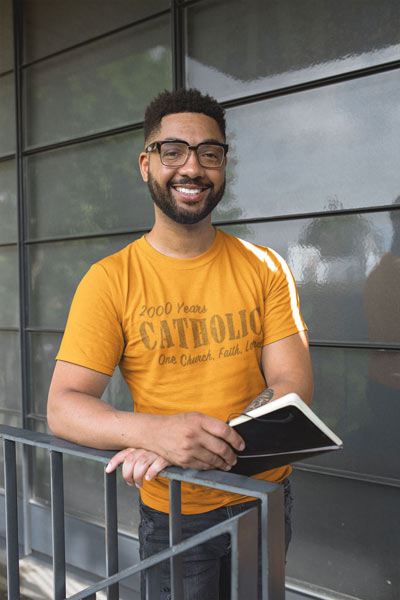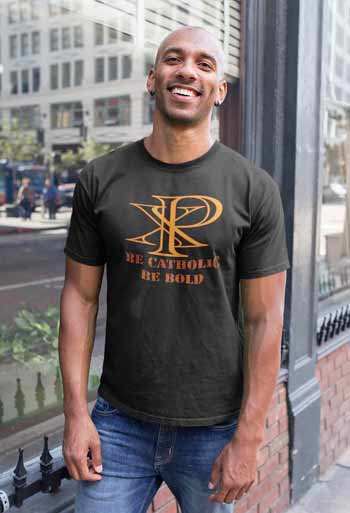I’m pleased to welcome Matthew Chicoine, whose writing displays a love of truth in charity, as a new contributor for Joy In Truth. Please check out our contributing writers’ page to read his bio and learn more about him. May God continue to bless his discipleship of evangelization in the Church—Deacon Frederick Bartels
According to the Catechism of the Catholic Church, the Eucharist is the source and summit of the Christian life. As the sacrament of the body and blood of Christ itself, it is the very heart of the Church from Whom the Church draws all her energy, all her life.
By Matthew Chicoine
9 September 2017
From a young age, I always saw the world through a scientific lens. I needed to understand how the world worked. When I attended college, that way of thinking applied to research papers and ensuring I had logical and concise arguments to articulate my interpretation of a particular historical event.
When I read the Gospel of John there is a logical flow to his account of the Gospel events. His entire gospel is masterfully written and laden with tons of symbolism. As a cradle Catholic, I heard John 6 (Jesus’ Bread of Life Discourse) preached frequently during the Mass. It took years of analyzing this chapter and critically viewing it before I realized the genius and truth contained in Christ’s message. Inevitably my close reading of John 6 led me to this conclusion: the evangelist truly believed that Jesus was the literal bread of life that gives humanity eternal life! I give three strong pieces of evidence for this case:
1. Jesus as a Good Teacher: I think most people would agree with me that Jesus’ followers considered him a good teacher. Jesus could relate to an array of people: the rich, the poor, fisherman, tax collectors, sinners, and strangers alike. Secondly, Jesus taught using a plethora of means including sermons, parables, and miracles to name a few. A quality in any good teacher is consistency in content along with the ability to clarify their subject content should disputes arise. In the bread of life discourse in John 6, Jesus presented both his teaching consistently and clearly. Within a span of 24 verses (John 6:35-59), Jesus mentions point blank at least 6 times that he is the bread of life. In verse 35, Jesus states, “I am the bread of life; he who comes to me shall not hunger, and he who believes in me shall never thirst.” Verses 38, 48, 53-58 also support the Nazarene’s intrepid claim.
2. It’s all Greek to Me: There are a variety of Greek words for the English verb “to eat.” Jesus stated in John 6:54, “he who eats my flesh and drinks my blood has eternal life and I will raise him on the last day.” The Greek word that the Evangelist used in this verse is trõgõ. Trõgõ is translated as “chew” or “gnaw.” Why would John use such a fleshy and literal word for “eat” in this context? This translation only makes sense if we accept that Jesus literally meant that he is the bread of life. John even goes on to use trõgõ in verses 56, 57, and 58–a grand total of four times!
3. Loss of Followers: The evangelist writes in John 6:66 that many people who followed Jesus from the start of his ministry left him never to return. They were scandalized by the teaching of Jesus as the bread of life. I thought long and hard on this point. Why would many of Jesus’ followers leave him if he only spoke symbolically that he was the bread of life? Well, if Jesus truly did intend for his claim that he is the “bread of life” to be interpreted figuratively, I doubt many followers would have left him that day. I mean think about it, people tend to become disenchanted with a leader when his or her message becomes too scandalous to bear. I doubt a man speaking figuratively, and poetically, would gather such scandal. Jesus repeatedly claimed, “I am the bread of life.” He never qualified that assertion to be taken figuratively. Such difficult news may have been too much for these fair weather followers to swallow.
According to the Catechism of the Catholic Church, “The Eucharist is the ‘source and summit of the Christian life'” (CCC 1324)—it is a non-negotiable belief. Inspired by the Holy Spirit, Saint John knew of the importance of this sacrament and he stressed it frequently in Jesus’ Bread of Life Discourse. Through my Catholic faith, I accept Jesus’ claim that he is the bread of life. I ponder this question of Jesus frequently: Will you also go away? I ultimately hope that my answer is consistent with Peter’s response, “Lord, to whom shall we go? You have the words of eternal life, and we have believed, and have come to know that you are the Holy One of God” (John 6:67-69).

Matthew Chicoine is a free-lance writer, faithful Catholic, and an avid truth seeker. Matthew has written book reviews for Homiletic and Pastoral Review and published works for Catholic Insight Magazine as well. He earned an M.A. in theology from Franciscan University of Steubenville in 2014. Please feel free to visit his blog at mattchicoine.wordpress.com to learn more about his love of Catholicism. He is also the author of Saturday with Saints on www.robertbatch.com





Jesus is the Bread of Life. this supports who Jesus claims to be. “I Am The Way, The Truth and The Life” From a cosmological position there can be only one Universal Truth, Life Exists. There is no difference between Truth and material facts unless we insert a dualism into our thinking. Material facts are for humans where Truth must relate to all living things.
Living beings remain alive by eating other Life forms. In the Eucharist which we highlight the Bread of Life is the center of our Faith. Theologians got mixed up in some of their thinking to explain this. According to Jesus this is My Body, this is My blood. All living things are interdependent. All living things believe in God and eat God to have eternal Life. “I Am the Resurrection and the Life” The Way is to believe in Life and all living things will have Life in its fullness.
the